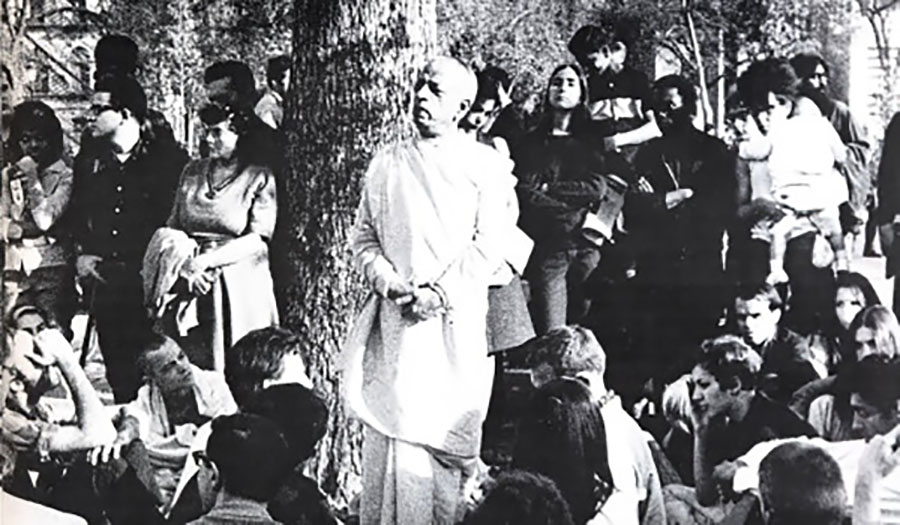ISKCON 50 Meditations: November 14, 2016
By Satsvarupa dasa Goswami | Ноя 14, 2016

Srila Prabhupada’s Gift of Vaisnava Compassion
I can’t begin to comprehend all the suffering that is going on in the world, nor do I want to. It’s too bewildering and painful. I also cannot comprehend Prabhupada’s depth of compassion and his strong desire to bring everyone he encountered in his mission relief from their pangs. As a neophyte devotee at 26 Second Avenue I began repeating phrases like “the sufferings of repeated birth and death,” “the threefold miseries,” and “the fallen souls suffering in material nature”—until these phrases sometimes became clichés or merely philosophical concepts. But a mahatma whose heart is expanded, actually feels compassion for the sufferings of other souls.
As a Vaisnava ачарьи, Srila Prabhupada cautioned whoever he met not to try the impossible. Sometimes a man would challenge Prabhupada, “What are you doing to help suffering humanity?” Or, “How can we help everyone in the world?” Prabhupada would reply, “Do you know all living beings? No, that is not possible.” Or he would remind the person with the world-embracing view they couldn’t do anything to alleviate suffering or even end their own suffering. Therefore, Prabhupada’s first lesson in compassion was to point out our ignorance of how to do good. The universe is not chaotic, meaningless suffering. There are strict laws that govern all activities, such as the laws of karma и samsara (transmigration of souls). If we ignorantly try to meddle with these laws with the sentiment of “doing good,” it will not help anyone.
Every student of Бхагавад-гита is faced with the misplaced compassion of Arjuna. Arjuna’s unwillingness to fight with his bodily relatives is sometimes praised as compassion, and sometimes criticized as ignorance and cowardice. When the Бхагавад-гита first describes Arjuna as “overwhelmed with compassion,” Prabhupada comments, “He was also crying out of compassion. Such symptoms in Arjuna were not due to weakness, but to his softheartedness, a characteristic of a pure devotee of the Lord.” But a little later in the same chapter, Srila Prabhupada explains how Arjuna’s feelings are misplaced:
No one knows where compassion should be applied. Compassion for the dress of a drowning man is senseless. A man fallen in the ocean of nescience cannot be saved simply by rescuing his outward dress—the gross material body. One who does not know this and laments for the outward dress is called a sudra, or one who laments unnecessarily. Arjuna was a ksatriya and this conduct was not expected from him. Lord Krishna, however, can dissipate the lamentation of the ignorant man, and for this purpose the Бхагавад-гита was sung by Him. (Bg. 2.1, purport)
Every human being should aspire to be kind to others, but the work begins with oneself. When we learn the first lessons of Bhagavad-gita, we grasp the concept of self-realization: We are not the body, we are spirit soul. Only when this knowledge is established can we become responsible to help others. As Prabhupada would say, “Physician, heal thy self.” People would sometimes misunderstand Srila Prabhupada and see him as a religionist who was concerned with the soul and God, but unconcerned for people’s suffering in the here-and-now. But this is not a fact. As a sadhu who cuts illusion, Srila Prabhupada derided misplaced compassion but was himself engaged in the most important welfare work for all living beings. He was compassionate in the enlightened way, to give people Krishna consciousness. Relief from suffering comes when we cease the cycle of birth and death and attain the eternal spiritual world. He also felt transcendental frustration because he knew what had to be done, and he himself was doing it, but so few people were helping him.















